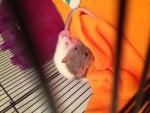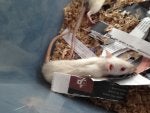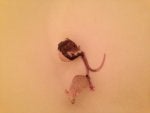I got two new rats Sunday, two males. I got them from a breeder. there were some red flags though. first, she had over 200 baby rats or so she said. which seems.. bad to me. I don't feel like you should have that many babies, it just doesn't seem right. she was running her breeding from a little trailer which she lives in. not only did she have a bunch of rat cages in her living room but also had lizards, bunnies, hamsters and snakes. anyways, onto the boys. I noticed her windows were all covered and it was kinda dark inside which might play a factor, but the rats are really small!the hooded rat she said is 5 months old and the other is only 3 months old according to her. also she said the ruby eyed boy was a Siamese but I looked into it and I think he's a himi. my question is, is it okay for them to be this small at their age? the hooded one fits into my palm and the other boy is a little smaller than him.

beardedrage
small rats?
beardedrage
Discussion starter
23 posts
·
Joined 2015
- Add to quote
I got two new rats Sunday, two males. I got them from a breeder. there were some red flags though. first, she had over 200 baby rats or so she said. which seems.. bad to me. I don't feel like you should have that many babies, it just doesn't seem right. she was running her breeding from a little trailer which she lives in. not only did she have a bunch of rat cages in her living room but also had lizards, bunnies, hamsters and snakes. anyways, onto the boys. I noticed her windows were all covered and it was kinda dark inside which might play a factor, but the rats are really small!the hooded rat she said is 5 months old and the other is only 3 months old according to her. also she said the ruby eyed boy was a Siamese but I looked into it and I think he's a himi. my question is, is it okay for them to be this small at their age? the hooded one fits into my palm and the other boy is a little smaller than him.
Attachments
-
194 KB Views: 104
-
167.9 KB Views: 91
-
241.4 KB Views: 85
-
153.3 KB Views: 91
111 posts
·
Joined 2015
They seem very small, my boys are about 4.5 months and they're much larger (at least it looks like it to me). And 200 babies seems like an awful lot, especially if it's a single wide trailer (and filled with other animals). They may have been the runts of their litters, are they both from the same litter? If you're concerned you could always take them to a vet to get checked out 
1,390 posts
·
Joined 2014
Yeah the albino or PEW one looks about the same size as my 3 month old PEW. IF they are eating well and gaining weight than it shouldn't be too much of a problem.
beardedrage
Discussion starter
23 posts
·
Joined 2015
some of them were in Guinea pig cages stacked on each other with maybe 6-8 rats in one single floored cage. some of them were in bird cages!! and she seemed completely shocked that I showed up with a plastic tub to put them in. I just told her that their cage was too large to just be hauling around and she said oh okay. but I asked her why they were so small and she said some of her rats just stay small because she breeds the small ones with the small ones. they seem to be eating all the food I put in there unless they're just dumping it all and pushing it out. the hooded one has some kind of bump on his side, I did some research and it looks like a small abscess but I can't be sure since I don't really know and he doesn't sit long enough for me to get a good look or picture
996 posts
·
Joined 2011
She probably was a feeder breeder, since she had snakes. Feeder breeders sometimes need to have 200 rats at a time, either for their own snakes for for both their own, their friends, and maybe even some to sell to other snake owners.
I wouldn't be concerned about them being "small" as much as if they seemed thin or sickly. I have a rat who is tiny compared to the rest of my rats and normally she's in perfect health, but sometimes she gets underweight and THAT'S when it's a concern. So just keep an eye on their condition more than their size. As long as they aren't bony, I wouldn't worry.
I wouldn't be concerned about them being "small" as much as if they seemed thin or sickly. I have a rat who is tiny compared to the rest of my rats and normally she's in perfect health, but sometimes she gets underweight and THAT'S when it's a concern. So just keep an eye on their condition more than their size. As long as they aren't bony, I wouldn't worry.
2,871 posts
·
Joined 2011
She was likely a feeder breeder  Personally I would not feel all that great if she had so many animals in a small trailer....
Personally I would not feel all that great if she had so many animals in a small trailer....
The white one does seem like a himalayan. It is hard to tell in the pic, is their color very white? If they are white they are himi, if they are more cream they are going to be siamese.
Unless they are dwarfs....They are very small if that is their ages...she may have been wrong. Maybe 2-4 months both of them. It could be likely that they were not given good nutrition as babies. They will likely plump up a bit now being with you.
As long as they are not showing any signs of sickness then they should be ok. Just love them
The white one does seem like a himalayan. It is hard to tell in the pic, is their color very white? If they are white they are himi, if they are more cream they are going to be siamese.
Unless they are dwarfs....They are very small if that is their ages...she may have been wrong. Maybe 2-4 months both of them. It could be likely that they were not given good nutrition as babies. They will likely plump up a bit now being with you.
As long as they are not showing any signs of sickness then they should be ok. Just love them
6,246 posts
·
Joined 2011
We deal with a snake breeder who does rats as a sideline. He's actually a pretty gifted breeder of rats. He told me he started his line by crossing a strain of large fancy show rat with another strain of small rats. I'm thinking smaller rats may be beneficial for a snake breeder that would typically have smaller juvenile snakes to feed?
But the upshot of this decision seems to be some very healthy rats. Some research suggests that dwarf rats don't commonly get mammary tumors, so tumors may be linked with growth hormones... Our oldest girl Cloud is pretty pudgy and a year and a half old, but she weighs only 1 lb and still fits into a small igloo. Our more common feeder rats grew fast and made it up to over 20 oz. but got mammary tumors as did our huge high white show type rat.
Breeding is, in part, science and in part art, to some degree it's a gift and to some degree it's luck especially if the breeder is wumping up their own strains. I've seen my share of wild rats, and for the most part they are smaller than our domestic rats. So I'm not going to suggest that a smaller strain is a bad thing, in fact it might be good healthwise. About the only way you are going to know if your breeder is any good is to see how your rats do as they grow older.
I asked our breeder about his rats health and he flatly said, "They are healthy and they don't get sick." To be honest, it seemed like a pretty pat reply that the worst kind of BYB might give... But so far of the three rats that we and a friend adopted from him... they have in fact been perfectly healthy and they haven't gotten sick. They have great temperaments and all three go outside with their owners... Our two have qualified as true shoulder rats.
So while you have raised several red flags when it comes to your breeder, that doesn't mean you didn't adopt some very fine rats. Only time will tell. Small is not necessarily bad.
This is Cloud at around a year and a half old...
![]()
And here she is with Misty about a year younger... The fence is standard size for comparison.
![]()
But the upshot of this decision seems to be some very healthy rats. Some research suggests that dwarf rats don't commonly get mammary tumors, so tumors may be linked with growth hormones... Our oldest girl Cloud is pretty pudgy and a year and a half old, but she weighs only 1 lb and still fits into a small igloo. Our more common feeder rats grew fast and made it up to over 20 oz. but got mammary tumors as did our huge high white show type rat.
Breeding is, in part, science and in part art, to some degree it's a gift and to some degree it's luck especially if the breeder is wumping up their own strains. I've seen my share of wild rats, and for the most part they are smaller than our domestic rats. So I'm not going to suggest that a smaller strain is a bad thing, in fact it might be good healthwise. About the only way you are going to know if your breeder is any good is to see how your rats do as they grow older.
I asked our breeder about his rats health and he flatly said, "They are healthy and they don't get sick." To be honest, it seemed like a pretty pat reply that the worst kind of BYB might give... But so far of the three rats that we and a friend adopted from him... they have in fact been perfectly healthy and they haven't gotten sick. They have great temperaments and all three go outside with their owners... Our two have qualified as true shoulder rats.
So while you have raised several red flags when it comes to your breeder, that doesn't mean you didn't adopt some very fine rats. Only time will tell. Small is not necessarily bad.
This is Cloud at around a year and a half old...

And here she is with Misty about a year younger... The fence is standard size for comparison.

227 posts
·
Joined 2014
Breeding rats as snake food is,,well since this forum is monitored,,I can not say what I think, ( I could but it may be censored)but maybe people who bred rats as food may end up as food themselves.
beardedrage
Discussion starter
23 posts
·
Joined 2015




i'm not really sure.. he looks more cream to me but i can't be positive especially since he's very skittish and usually runs away from me whenever he gets the chance.
also, my hooded boy, anyone know what color his hood is? the pictures make it look a little darker but his hood is like a dark grey. and he has a little bump on his side, i'm not sure what it is. i think it popped up overnight when i first got him but it's gotten smaller.
they have plumped up a little bit since i got them and it's only been a week! they were super tiny and skinny, but now they always have food in their dish which i don't think they had at the breeder's.
2,871 posts
·
Joined 2011
Just for the info...you don't actually make dwarfs by breeding smaller rats. Dwarf is a simple recessive gene. & it does involve alittle more than size. They so far seem to be less prone to tumors.He told me he started his line by crossing a strain of large fancy show rat with another strain of small rats. I'm thinking smaller rats may be beneficial for a snake breeder that would typically have smaller juvenile snakes to feed?
But the upshot of this decision seems to be some very healthy rats. Some research suggests that dwarf rats don't commonly get mammary tumors, so tumors may be linked with growth hormones...
They are also quite a bit smaller then standard rats. I have seen the size around 115g compared to an adult female of 340g/males 500+g That is quite a difference!!
Standard rats can vary in size quite a bit actually. I have some smaller girls myself.
111 posts
·
Joined 2015
I got two pet store rats at the same time back in August. They were the same size at the time. Now, one is much bigger than the other. I think one is just going to be bigger. They both seem healthy and happy. So, maybe your rats are just going to be on the small side.
13 posts
·
Joined 2015
They look a lot younger than 3 months, they look the same size as my rats did when I got them at 5 weeks. Maybe she lost track of the ages? 200 baby rats seems like a lot to keep track of. I would feed them baby rat food and monitor their size.
My rats at 5 weeks:
![]()
![]()
![]()
My rats at 11 weeks:
![]()
![]()
Also here is a rat growth chart I found (on a reptile forum?!?!)
http://www.reptileforums.co.uk/forums/feeder/16801-mouse-rat-size-chart.html
My rats at 5 weeks:



My rats at 11 weeks:


Also here is a rat growth chart I found (on a reptile forum?!?!)
http://www.reptileforums.co.uk/forums/feeder/16801-mouse-rat-size-chart.html
beardedrage
Discussion starter
23 posts
·
Joined 2015
according to this growth chart, my larger boy is about 6-8 weeks old and the other boy is about 5 weeks old.
i'm not sure why she would tell me they were older than they actually are? unless she wasn't able to keep track of all the babies.
so maybe they're not small, maybe they're just younger than i thought!
i'm not sure why she would tell me they were older than they actually are? unless she wasn't able to keep track of all the babies.
so maybe they're not small, maybe they're just younger than i thought!
6,246 posts
·
Joined 2011
It's true that dwarfs aren't just small rats. And although you can make a line of rats smaller through breeding, you won't get true dwarfs... I just mentioned dwarfs because they lack growth hormone and tend to have fewer or no tumors. Thereby drawing some association that may or may not exist between size and tumors.
I realize that there is always a danger in proposing hypothesis based on anecdotal evidence... You can wind up with the sun rising and falling over a flat earth if you get it wrong. Still some hypothesis is better than no theory at all, I suppose, in the end lots of theories do become scientific fact eventually... and whether the earth is round or flat, the sun does rise and set every day....
As to breeding rats for snake food, I do tend to agree, it's very upsetting... but it's the state of the world as it is. Every time we have adopted a rat from a snake food bin or from our current breeder we have had to leave all of the others behind and that always makes me feel guilty and really crappy about those rats we don't adopt. In a perfect world all of the babies we meet should go to good homes. For every one we adopt dozens have a terrible fate ahead of them and it makes our decision hard. Why is one rat more special than all of the others, how do I know I'm saving the right rat or the best rat? Did I miss something? Did I leave the next Fuzzy Rat behind to be eaten by a snake? There's no right answer, and perhaps no wrong one. In the end, I suppose it comes down to luck. But I've got to satisfy myself with the fact that I saved a few wonderful rats that lived good lives... In the smallest way and for a few lucky rats, we've made a difference and for now in an unfair world, it's the best we could do.
And lastly... for most of us, when we sit down to a meal and we eat meat, aren't we also usually eating an animal raised for food? I mean how many of us actually hunt wild animals that have a chance of escaping? It's an unfair world for those who can be eaten...
I realize that there is always a danger in proposing hypothesis based on anecdotal evidence... You can wind up with the sun rising and falling over a flat earth if you get it wrong. Still some hypothesis is better than no theory at all, I suppose, in the end lots of theories do become scientific fact eventually... and whether the earth is round or flat, the sun does rise and set every day....
As to breeding rats for snake food, I do tend to agree, it's very upsetting... but it's the state of the world as it is. Every time we have adopted a rat from a snake food bin or from our current breeder we have had to leave all of the others behind and that always makes me feel guilty and really crappy about those rats we don't adopt. In a perfect world all of the babies we meet should go to good homes. For every one we adopt dozens have a terrible fate ahead of them and it makes our decision hard. Why is one rat more special than all of the others, how do I know I'm saving the right rat or the best rat? Did I miss something? Did I leave the next Fuzzy Rat behind to be eaten by a snake? There's no right answer, and perhaps no wrong one. In the end, I suppose it comes down to luck. But I've got to satisfy myself with the fact that I saved a few wonderful rats that lived good lives... In the smallest way and for a few lucky rats, we've made a difference and for now in an unfair world, it's the best we could do.
And lastly... for most of us, when we sit down to a meal and we eat meat, aren't we also usually eating an animal raised for food? I mean how many of us actually hunt wild animals that have a chance of escaping? It's an unfair world for those who can be eaten...
-
?
-
?
-
?
-
?
-
?
-
?
-
?
-
?
-
?
-
?
-
?
-
?
-
?
-
?
-
?
-
?
-
?
-
?
-
?
-
?
- posts
- 570K
- members
- 50K
- Since
- 2006
A forum community dedicated to Rat owners and enthusiasts. Come join the discussion about breeds, health, behavior, housing, adopting, care, classifieds, and more!
Explore Our Forums







